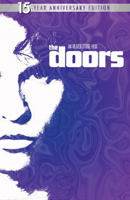BUY IT AT AMAZON: CLICK HERE!
STUDIO: Lionsgate
MSRP: $19.98
RATING: R
RUNNING TIME: 138 minutes
SPECIAL FEATURES:
• "Jim Morrison: An American Poet in Paris" documentary
• "The Doors in L.A." documentary
• "The Road to Excess" documentary
• Feature commentary w/ director Oliver Stone
• Behind-the-scenes featurette
• Deleted scenes
• Trailers
The Pitch
"It’s what you’d expect from a movie about a guy who claims to be the Lizard King."
The Humans
Val Kilmer (Kiss Kiss Bang Bang), Meg Ryan (Innerspace), Kyle MacLachlan ("Muad-dib!")
The Nutshell
The life and times of Doors frontman Jim Morrison are offered up to the altar of audience, with only a little tampering to make history align with
The Lowdown
The Doors does not make a lot of sense. It doesn’t have much of a thesis. Its vignettes are sometimes connected by nothing more than character, and even then moods swing so violently that characters seem to change between the cuts. It’s a sprawling piece of biography that sinks a mandate of art imitating life as its anchor and never pulls away. Instead of providing a logical progression of Jim Morrison from impatience to self-importance to death, it shows what a muddle life is, and that epiphanies can come without dramatic buildup. It is quite frequently beautiful.
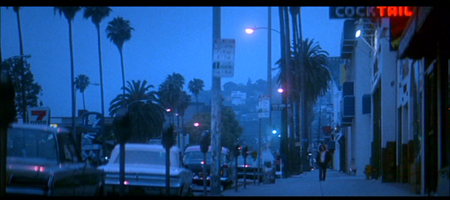
Emphasis mine.
And, like its script’s many recounted drug trips, it noodles around with occasional trance-like power, and occasional ridiculousness — some of which makes sense if you’re caught up in the moment, while the rest just reminds you of watching a drunk friend while being stone sober yourself.
I mention these things not as negative criticisms but as descriptors of the mood that director Oliver Stone successfully attained. The Doors features a Jim Morrison who is rarely sober, rarely seen without a joint or a bottle in his hand, and the film boils over with the same fevered mind that, arguably, the drugs and alcohol set loose in Morrison. Its scenes may be uncomfortably juxtaposed, but together they form a picture of a consistent world.
It’s a world that would seem unremarkable if it weren’t filtered through the film’s subject, Jim Morrison as played by Val Kilmer. In one of the finer roles of his career, Kilmer captures the hedonism, experimentation, and fits of pretension that define Morrison in memory, as well as the flashes of humanity that show through like a beak tapping through an eggshell. Kilmer’s conviction as Morrison famously disturbed the surviving members of the band, to the point where they couldn’t distinguish between Kilmer’s performances and those of their old partner. (For the curious, the film alternates between Morrison’s voice in certain songs and Kilmer’s, depending on the distance of the shot.)
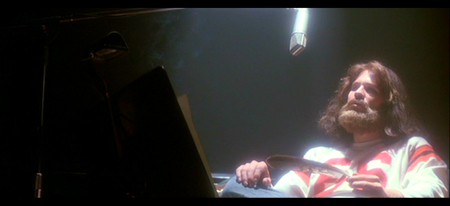
"Why don’t we just wait here for a little while? See what happens."
The film orbits Morrison so closely that it’s impossible to get either him or his influence out of sight. Even on those rare occasions that Kilmer isn’t in the shot, the soundtrack for the film is laden with music from the band, with hardly even an intrusion of orchestral score. There is a slight problem with this in that the Doors’ music isn’t exactly varied enough to match well the emotional tones of the textured script. Fortunately, the tunes do more to support the focus of the film than they distract from its beats of story.
Reductionists have long rendered all art as having only three concerns: Sex, death, and god. With The Doors I feel, for the firs time, that such strict simplicity is applicable, and explicitly so. Stone, by way of Morrison, declares that all life is an escape from death, that sex takes you away from death, and that by conquering death you become like a god. The interplay between these three forces in tension creates the direction for Morrison, their gravitic forces pulling him toward sexual expression, courts with death, and claims of godhood. It’s startlingly easy to comprehend Morrison’s motivations, as a result, particularly keeping in mind that the film plays like a fugue.
There’s one more force in play, though, which Morrison never considered, despite its predominance in poetry, and that’s the love of other people. Morrison’s long-time, tolerant girlfriend Pam (Ryan) appears throughout the film, from the first sequence to the last, and exerts her weak power as much as she can, until it leaves her exhausted and spent. It’s interesting to note that even in the culture of solipsism that Morrison inhabits, a sense of monogamy is the engine that, in some ways, keeps him alive. Pam tries so hard to break Morrison out of the triangle of sex, death, and god, and she never quite succeeds. It’s a bitter picture painted by the admission that love does not conquer all, that it only conquers those who surrender to it.
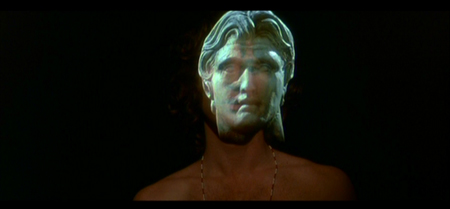
I don’t even know why Stone bothered making Alexander.
The Doors concludes with no redemption, no resurrection of Morrison’s spirit. The world that owned Morrison was elastic, allowing briefly for lives that refuse to compromise before snapping back into place. Morrison himself had no patience for minds that weren’t mutable. The two philosophies are incompatible, and in a title fight between the world and a man, I’m going to bet on the world. The film is one of my favorite in Stone’s list of credits for showing a complicated man through complicated means. Its jumble of music, drug trip, and narrative styles make it all the more rewarding, instead of the crumbled mess it has every right to appear.
The Package
First off, there’s an unadvertised commentary track by director Oliver Stone on the first disc. It’s not much of a track, unfortunately. Stone keeps very quiet, only interfering with a scene if he wants to underscore something that was more often than not already apparent to the audience. He also indulges in just the tiniest portion of self-congratulation, which I suppose is his due, but if he says it all then what am I supposed to say? "Good job, Ollie. You were usually right."
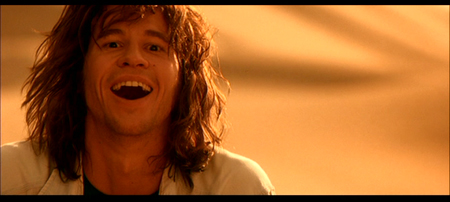
"A brick! I just got it!"
The first disc also features a newly-remastered transfer, which displays some fine work in the mastering lab. The palette is wide and colorful, and the details are crisp on any display. Similarly appreciated is the brand new 6.1 DTS track. It’s almost worth it to buy this set just for surround sound Doors in such good quality, if you’re a fan.
The second disc features a trio of lengthy and well-presented documentaries: "Jim Morrison: An American Poet in Paris," which details Morrison’s life in the period before his death, after he had moved to Paris with Pam to focus on writing; "The Doors in L.A.," which covers the early days of the band, their sudden rise to prominence, and the effects they almost accidentally had on the city’s counterculture; and "The Road to Excess," an exploration of the effects both positive and negative that Morrison’s hedonistic lifestyle had on his art. All three are well-made docs, scholarly and informative, like a good history of pop culture ought to be.
The disc also has deleted and extended scenes of significant quantity but questionable worth, a brief behind-the-scenes featurette, and original trailer and teaser material.
7.9 out of 10
